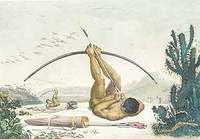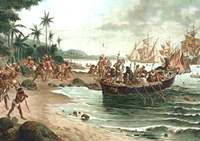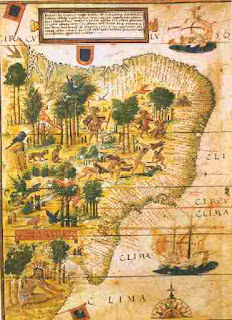 Learning some facts about Brazil...
Learning some facts about Brazil...Here are some really basic facts:
Population: 186.771.000 inhabitantsArea: 8.547.403 square kilometers ( 3,300,169 square miles ).
Currency Name: Brazilian Real
Code: BRL
Symbol: R$
Climate: Mainly tropical, but temperate in the southern region.
Ethnic groups:White (which includes Portuguese, German, Italian, Spanish, Polish): 55%. Mixed white and black: 38%. Black 6%. Other ethnic groups ( which includes Japanese, Arab and Amerindian people ): 1%
Electricity:127/220V 60Hz
Time Zones:
GMT/UTC -2 (Fernando de Noronha archipelago)
GMT/UTC -3 (Brazil Standard Time)
GMT/UTC -4 (Central Brazil Time)
GMT/UTC -5 (Acre Standard Time)
Country Dialing Code: +55
Measurement system: Metric system
If you'd like to learn more about Brazil, read on to find other interesting (and short!) facts of Brazil together with YouTube videos...
At the end of this post, I list a number of sites where you can receive further relevant information on this topic.
Enjoy!
Language
Brazil's official language is Portuguese and it is spoken by nearly the entire population.
Brazil is the only Portuguese-speaking nation in the Americas,thus making the Portuguese language the number one factor in Brazil’s national identity.
Brazil has many minority languages spoken daily throughout her vast national territory; some of these languages are spoken by indigenous peoples (180 Amerindian languages are spoken in remote areas!), while others are spoken by immigrants and their descendants.
Brazilian Portuguese has had its own development, influenced by the Amerindian and African languages making it different from that spoken in Portugal and other Portuguese-speaking countries. Most differences lies in the language's phonological, orthographic and lexical patterns.
If you are interested in learning Portuguese, please visit my post Learn Portuguese.
History
History of Brazil in one breath:
Brazil or Brasil?
It is generally agreed that the name Brasil has its origins in the then ubiquitous Brazilwood.Brazilwood (in Portuguese "Pau Brasil") is a Brazilian timber tree with a dense and reddish trunk.
Pau Brasil provides a red dye which was highly appreciated by the Europeans.
There are other well-known versions of how Brazil got her name; like, for example, the very interesting article on the site BrazilBrazil.
The Indigenous Population
 There were about 100 million natives prior to the arrival of the Portuguese.
There were about 100 million natives prior to the arrival of the Portuguese. The two main ethnic groups were the Tupis and the Guaranis.
The cultural life of most tribes either disappeared or intermingled with others, in particular, the Portuguese and the African.
Today, it is estimated that there are 400.000 surviving natives.
The Portuguese
 On April 22nd, 1500, the Portuguese navigator and explorer,Pedro Álvares Cabral, arrived with his 13 vessels fleet to the shores of Brazil.
On April 22nd, 1500, the Portuguese navigator and explorer,Pedro Álvares Cabral, arrived with his 13 vessels fleet to the shores of Brazil.Brazil then became Portugal's colony til 1882.
The Africans: Slavery in Brazil

As the remaining indigenous tribes failed to meet the needs of the colonists for farm and mine workers, the new land owners began bringing the African slaves.Over 3 million slaves were brought from Africa to Brazil.
I've found this amazing collection of YouTube videos on Slavery in Brazil. This documentary series was produced by The Discovery Channel and uploaded by 10NYX. (A huge thank you to you both!):
1- Slavery in Brazil, Part 1
2 - Slavery in Brazil, Part2
3 - Slavery in Brazil, Part3
4 - Slavery in Brazil, Part4
5 - Slavery in Brazil, Part5
From Independence to Today
 In 1822, Brazil declared independence from Portugal.
In 1822, Brazil declared independence from Portugal.Slavery was abolished soon after, in 1888.
In 1889, the then Emperor of Brazil, Dom Pedro II, abdicated.
 A republican government was established.
A republican government was established.
In the 20th century, there were various military coups against the Republican democracy.
The last and successful one happened in 1964.
 Brazil was plunged into an era of hardcore dictatorship for 25 years.
Brazil was plunged into an era of hardcore dictatorship for 25 years.
But, in 1989, Fernando Collor became Brazil's first democratically elected president. Three years after that, he was impeached under heavy corruption charges.
 In a modern tale of rags to riches, former shoe-shine boy Luiz Inácio Lula da Silva, popularly known as Lula, became the nation’s president in 2002.
In a modern tale of rags to riches, former shoe-shine boy Luiz Inácio Lula da Silva, popularly known as Lula, became the nation’s president in 2002.
He has been the first left-wing leader of Brazil ever since.
For those of you who would like to learn more about Brazilian History, here is a 3-part PowerPoint slide video with a more detailed outline on the History of Brazil. This series was uploaded by RTiglath from Brazil. Thank you Richard! :-)
1- Facts of Brazil: Brazilian History, Part 1:
2- Facts of Brazil: Brazilian History, Part 2
3- Facts of Brazil: Brazilian History, Part 3
Economy
Characterized by large and well-developed agricultural, mining, manufacturing, and service sectors, Brazil's economy outweighs its competitors in South America, and is expanding its presence in the global market.
Having overcome the 2001-03 financial turmoil, capital inflows are regaining strength and the currency has resumed appreciating.
The resilience in the economy stems from commodity-driven current account surpluses, and sound macroeconomic policies that have bolstered international reserves to historically high levels, reduced public debt, and allowed a significant decline in real interest rates.
A floating exchange rate, an inflation-targeting regime, and a tight fiscal policy are the three pillars of the economic program.
From 2003 to 2007, Brazil ran record trade surpluses and recorded its first current account surpluses since 1992. Productivity gains coupled with high commodity prices contributed to the surge in exports. Brazil improved its debt profile in 2006 by shifting its debt burden toward real denominated and domestically held instruments.
President Lula restated his commitment to fiscal responsibility by maintaining the country's primary surplus during the 2006 election.
Following his second inauguration, the president announced a package of further economic reforms to reduce taxes and increase the investments in infrastructure.
Culture
A wide number of elements influenced Brazilian culture. Its main early influence came from Portuguese culture, because of strong colonial ties with the Portuguese empire.
Other aspects of the Brazilian culture are contributions of European and Asian immigrants, Native South American people (such as the Tupi indigenous people), and African slaves.
Thus, Brazil is a multicultural and multiethnic society. Italian, German and other European immigrants came in large numbers and their influences are mostly noticed in the Southeast and Southern regions of Brazil.
Amerindian people influenced Brazil's language and cuisine and the Africans, brought to Brazil as slaves, influenced the Brazilian music, dance, cuisine, religion and language.
Brazil's cultural tradition extends to its music styles which include samba, bossa nova, forró, frevo, pagode and many others. Brazil has also contributed to classical music, which can be seen in the works of many composers.
Brazilian Carnival is an annual celebration held 40 days before Easter and marks the beginning of Lent. Brazilian Carnival has distinct regional characteristics. Other regional festivals include the “Boi Bumbá” and “Festas Juninas” (June Festivals).
Religion
The most popular religion in Brazil is the Roman Catholicism and the country has the largest Catholic population in the world. Even though, adepts of the Protestantism are rising in numbers.
Until 1970, the majority of Brazilian Protestants were members of "traditional churches", mostly Lutherans, Presbyterians and Baptists. Since then, numbers of Pentecostal and Neopentecostal members have increased significantly.
Although Islam was first practiced by African slaves, the Muslim population of Brazil is comprised mostly by Arab immigrants. However, a new trend has been the increase in conversions to Islam among non-Arab citizens; only 27,000 Muslims live in Brazil as of 2000.
The largest population of Buddhists in Latin America lives in Brazil, mainly because the country has the largest Japanese community living outside Japan.
The latest IBGE census presented the following numbers: 74% of the population is Catholic (about 139 million); 15.4% is Protestant (about 28 million), including Jehovah's Witnesses (1,100,000) and the Church of Jesus Christ of Latter-day Saints followers (600,000); 7.4% of them consider themselves as being agnostics or atheists or without a religion (about 12 million); 1.3% follow the Spiritism (about 2.2 million); 0.3% follows African traditional religions such as Candomblé and Umbanda and 1.7% are members of other religions. Some of these are Buddhists (215,000), Jews (150,000), Islamic followers (27,000), and some practice a mixture of different religions.
Sports
Football is the most popular sport and an important fact about Brazil.The Brazilian national football team is currently ranked second in the world according to the FIFA World Rankings. They have been victorious in the World Cup tournament a record five times, in 1958, 1962, 1970, 1994 and 2002.
Some sport variations have their origins in Brazil. Beach football, “futsal” (official version of indoor football) and ‘footvolley’ emerged in the country as variations of football.
Basketball, volleyball, auto racing, and martial arts also attract large audiences.
Though not as regularly followed or practiced as the previously mentioned sports, tennis, team handball, swimming, and gymnastics have found a growing number of enthusiasts over the last decades.
In auto racing, Brazilian drivers have won the Formula 1 world championship eight times: Emerson Fittipaldi (1972 and 1974), Nelson Piquet (1981, 1983 and 1987) and Ayrton Senna (1988, 1990 and 1991). The circuit located in São Paulo, Autódromo José
Carlos Pace, hosts the annual Grand Prix of Brazil.
In martial arts, Brazilians have developed the Capoeira, Vale-Tudo (freestyle fighting) and the Brazilian Jiu-Jitsu.
Brazil has undertaken the organization of large-scale sporting events: the country organized and hosted the 1950 FIFA World Cup and was chosen to host the 2014 FIFA World Cup event.
São Paulo organized the IV Pan American Games in 1963 and Rio de Janeiro hosted the XV Pan American Games in 2007.
Other Online Resources to learn more Facts of Brazil:
1 - This is a short article by UNESCO where you can read about slavery in Brazil.
2 - Wikipedia's article on Brazilian slavery is a great read on the topic.
3 - The Economist.com offers you a great briefing on Brazil's economy and other information on this country. A good place to start!
4 - Country Studies has escellent articles on the Politics of Brazil (and other countries too...).
5 - Visit Eyes On Brazil and read relevant information on Brazil, including topics about the Brazilian music scene, Brazilian artists, the Portuguese language, and many others.
Other Related Posts
:Learn Portuguese | Flag of Brazil | Brazilian Baby Names
Other Languages on this Blog:
Arabic | Chinese | Hebrew | JapaneseDo you know some interesting facts about the country? |


No comments:
Post a Comment